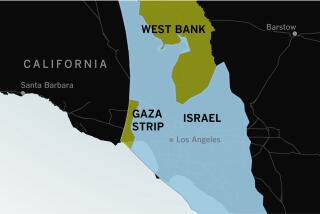U.N. chief tours Gaza Strip, Israel town
As residents of the Gaza Strip continued to sift through the rubble and mourn their dead, United Nations Secretary-General Ban Ki-moon toured the seaside Palestinian enclave Tuesday and declared himself “deeply grieved by what I have seen today.”
Ban entered Gaza from Israel in a convoy of armored vehicles. Speaking to reporters in front of the smoldering remains of a U.N. food warehouse set ablaze last week by an Israeli tank shell, a somber Ban said he had witnessed “heartbreaking” scenes of destruction.
“I have seen only a fraction of the damage,” he said. “This is shocking and alarming.”
Ban later visited the southern Israeli town of Sderot, long a target for rockets fired from Gaza by Palestinian militants. He called the attacks against Israeli residents “appalling and unacceptable.”
Israeli tanks and soldiers continued their withdrawal from Gaza on Tuesday, signaling an end to the devastating 22-day campaign against the Palestinian militant group Hamas, which seized control of Gaza from the rival Fatah faction after the collapse of a unity government in mid-2007.
Israeli officials had expressed a desire to be out of Gaza by the time Barack Obama was sworn in as president, but it was unclear whether all Israeli forces had officially left by the self-imposed deadline.
Normal life continued to return Tuesday in Gaza. Stores around Gaza City’s Palestine Square were bustling with customers. However, much of the northern third of the territory, scene of the heaviest fighting and airstrikes, lacked consistent flows of water and electricity. Some neighborhoods have been without power or water for more than three weeks.
More than 1,300 Palestinians were killed and more than 5,000 wounded during the Israeli assault, local medical officials say. The Palestinian Central Bureau of Statistics estimated that 21,000 buildings were damaged or destroyed -- nearly 1,000 structures every day of the Israeli campaign. The bureau estimated reconstruction costs, infrastructure damage and economic losses at nearly $2 billion.
The U.N. Relief and Works Agency, which has run schools and aid programs in Gaza since 1950, said that at least $330 million in emergency funding would be required for the most immediate needs.
“As the full scale of the destruction becomes clear, the figure will undoubtedly get larger. That is not a figure for reconstruction in Gaza. That is just for immediate repair and emergency relief,” UNRWA spokesman Christopher Gunness said.
At least 13 Israelis -- 10 soldiers and three civilians -- died in the conflict. Four of the Israeli military fatalities resulted from “friendly fire.”
International aid organizations are rushing emergency supplies and medical aid into Gaza through border crossings with Israel in the north and Egypt in the south. Israeli Cabinet minister Isaac Herzog said the goal was to allow as many as 500 truckloads a day to cross the border.
“The immediate need is mattresses, blankets, kitchen sets and plastic sheeting,” Anne-Sophie Bonefeld, a spokeswoman for the International Committee of the Red Cross, told the Reuters news agency.
Despite the devastation on display, Hamas declared a moral and strategic victory, with thousands of supporters parading through Gaza City on Tuesday, waving the green flags of the movement.
“Every time the attacks increase, our support increases,” one of the rally’s leaders shouted through a speaker system mounted on a truck. “We won’t surrender to destruction and we won’t surrender to the siege. We won’t surrender to the cowardly policies of the Zionists.”
Israeli President Shimon Peres on Tuesday expressed confidence that the offensive will successfully deter Hamas and other militant groups from launching rockets on Israel.
“There are dangerous people everywhere, and the question is whether or not they will use weapons,” he said in an interview with Israel Radio. “I think Hamas suffered a deterring blow.”
Meanwhile, Arab governments gathering at an economic summit in Kuwait condemned what they called excessive Israeli force and pledged support for the reconstruction of Gaza.
“We hold Israel responsible legally for the war crimes it committed,” Arab League Secretary-General Amr Moussa said.
But the deep divisions within the Arab world were also on display. States such as Syria and Qatar, which suspended its low-level ties with Israel over the Gaza assault, pushed for stronger language and urged Egypt, Jordan and others to reconsider their longtime diplomatic relationships with the Jewish state.
Moussa acknowledged that Arab leaders were split into moderate and hard-line camps.
“Arab affairs are still tense,” he said. “Things are still not good, in my opinion.”
--
Noha El-Hennawy of The Times’ Cairo Bureau, Gabby Sobelman of The Times’ Jerusalem Bureau and special correspondent Raed Rafei in Beirut contributed to this report.
More to Read
Start your day right
Sign up for Essential California for news, features and recommendations from the L.A. Times and beyond in your inbox six days a week.
You may occasionally receive promotional content from the Los Angeles Times.





